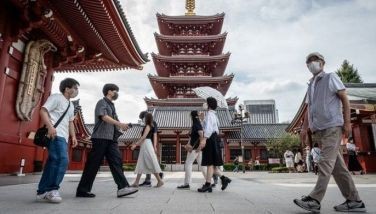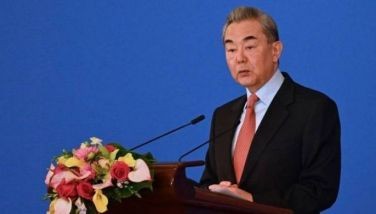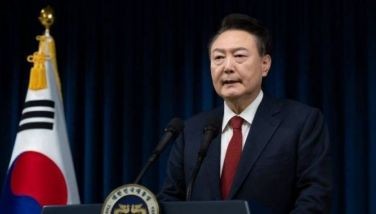Kerry faces tough sell in China on NKorea, tension
BEIJING — U.S. Secretary of State John Kerry is in China on a difficult diplomatic mission.
Kerry is meeting senior Chinese officials on Friday in Beijing to seek their help in bringing a belligerent North Korea back to nuclear disarmament talks.
At the same time, he's demanding that China roll back a series of increasingly aggressive steps it has taken to assert itself in territorial disputes with its smaller neighbors.
Kerry faces a tough sell on both counts.
The extent of China's influence with North Korea is unclear following a purge in the isolated country's leadership.
And, China has angrily dismissed U.S criticism over its moves in the East and South China seas that have alarmed U.S. allies like Japan and the Philippines.
In Seoul, South Korea, on Thursday, Kerry made clear the Obama administration is putting new emphasis on getting North Korea back to stalled six-nation talks aimed at getting it to give up nuclear weapons.
"Let me be clear," Kerry said. "The United States will not accept North Korea as a nuclear-armed state. We will not accept talks for the sake of talks. And the DPRK must show that it will negotiate and live up to its commitments regarding denuclearization."
Efforts toward that end, he said, would rely heavily on China, North Korea's only friend, putting pressure on Pyongyang.
"China has a unique and critical role that it can play," he said. "No country has a greater potential to influence North Korea's behavior than China, given their extensive trading relationship with the North."
But China's leverage with the North is being tested.
Diplomats say Beijing received no prior warning ahead of the December arrest and execution of North Korean leader Kim Jong Un's uncle, Jang Song Thaek, who had been considered Pyongyang's point man on China affairs and was a strong promoter of free trade zones being set up along their mutual border.
That came on the heels of Pyongyang's snubbing of Beijing's wishes when it conducted a missile test in late 2012, followed by the underground detonation of a nuclear device last spring.
Jang's removal was seen as depriving Beijing of its chief conduit into the North Korean regime and in the weeks that followed the leadership found itself at a loss as to how to proceed. A delegation of Chinese diplomats led by the Foreign Ministry's deputy head of Asian affairs visited Pyongyang last week in a sign that Beijing was attempting to renew dialogue with Kim's government, although it remains to be seen whether the North was any more receptive to China's pleas to return to the nuclear talks.
Those discussions involving the two Koreas, the United States, China, Russia and Japan, broke down at the end of 2008 and U.S. officials say they see no point of restarting talks until Pyongyang shows an authentic desire to make good on its prior commitments to dismantle its nuclear programs.
Meanwhile, making the U.S. case for restraint and clarification on the competing territorial claims and China's bitter dispute with Japan may be even tougher for Kerry.
Since sometimes violent anti-Japanese protests rocked major cities in late 2012, Beijing has continually stepped up its rhetoric against Tokyo, dispatching its diplomats to make China's case in the global media and at international forums, even dogging Japanese Prime Minister Shinzo Abe's recent trip to Africa.
Recent weeks have seen China's ambassador to London compare Japan to the evil Lord Voldemort of the Harry Potter books in the pages of Britain's Daily Telegraph newspaper. On Thursday, the official China Daily newspaper devoted a half page to grievances against Japan, while the Foreign Ministry revived the case of a 2010 confrontation between a Chinese fishing boat and Japanese coast guard ships to demand an apology and compensation from Tokyo.
More worrisome, Chinese patrol vessels have maintained a more-or-less constant presence in waters surrounding the disputed Diaoyu islands in the East China Sea, forcing the Japanese coast guard to go on the defensive to avoid a clash.
Chinese ships have also stepped up their presence in the South China Sea, particularly in regards to the Philippines, which is seen by Beijing as weak and overly dependent on the U.S. for protection. Diplomats are concerned that Beijing may be planning to declare an air defense zone above those heavily traversed waters, further raising the chances of confrontation with American surveillance planes and other military flights.
U.S. officials traveling with Kerry said he would urge the Chinese to show restraint, cool down its rhetoric and actions, and clarify its claims consistent with international law.
"The perception in the region and in the United States that is generated by the incremental actions that China has been taking ... is one of a country that is asserting its position through extra-legal and non-diplomatic means," one official said. "That's not a good image of China, and it is not a pattern of behavior by China that the U.S. or others want to see."
- Latest
- Trending




























